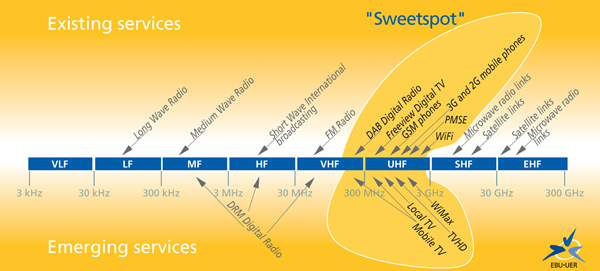
| Media Rules and Rulers |
 |
followthemedia.com - a knowledge base for media professionals |
|
|
ftm KNOWLEDGE
Europe’s Media Rules – From Television Without Frontiers to the FutureThe Television Without Frontiers Directive is all but a memory, soon to be replaced by the Audiovisual Media Services Directive. This ftm Knowledge file details the issues, the debates and the outcome. Also included are articles on competition, product placement and cinema. 51 pages PDF (June 2007) Free to ftm Members, others from €39 OrderAGENDA
|
||
Your television will go black…and other scary storiesIt’s the week to watch if you’re in Geneva or Brussels. Television, they say, is sure to suffer if nameless, faceless Eurocrats and functionaires have their way. Why can’t things be like the old days?
Well, they shouldn’t, said the European Broadcasting Union’s (EBU) new Technical Director Lieven Varmaele to a press gaggle (Wednesday November 14). Everybody seems to be new at the EBU. All the better to address new reality. You see (or don’t you), Mrs. Reding’s proposal for digital dividend somewhere off in the future is a digital nightmare in real-time. The UK’s National Audit Office, a public spending monitor, recently warned that television viewers in southern England might face interference from “high powered digital transmissions from France.” TV in France will go all-digital in 2011, a year ahead of southern England. Shutting off analogue television opens huge spaces for digital occupiers. Though some countries are hesitating, Mrs. Reding pronounced analogue TV dead in Europe by 2012, the dividend going to the highest bidder. Apparently, and we won’t know officially until later this week, the International Telecommunications Union (ITU) World Radioconference 2007 (WRC-07) will go with the same program.
The point made by EBU’s Vermaele – and shared by every broadcaster thinking about the present – is quite simple. (See Lieven Varmaele's digital 'sweetspot' graphic here) Too many signals (services) in the digital space cause an interference unlike the old analogue kind. The new digital services – mobile phones, mobile TV and digital TV – are bi-directional, receive and send. If mobile phone providers are using the same or nearby digital frequencies as digital TV providers your nearest neighbor making a phone call WILL blank out your TV reception. If the highest bidder for happens to be intent on providing very dense mobile internet services like WiMAX nobody in your building or block will be seeing Grey’s Anatomy or Big Brother, the telecom show. Mrs. Reding and the entire European Commission have a time horizon far longer than most media organizations. The arduous legislative process from proposal to implementation can take a decade, or more. Revising the Television Without Frontiers Directive, originally written in the 1980’s, remains a year or more from final authority. Projecting media’s future 15 to 20 years from now is not the stuff of genius, only fools. There is one exception: everything you see today will be obsolete; much of it will completely disappear. In this regard, Mrs. Reding is absolutely correct in visualizing service-neutral spectrum that fosters rapid and efficient take-up of digital services. One EC estimate shows 800,000 jobs created in mobile telephony and mobile internet related industries. Contrast that with the shrinking publishing and public broadcasting sectors. But the EBU and other broadcasting stakeholders are dealing with the here and now. Using fears that the blue glow from the living room television will turn black gives good talking points to politicians facing constitutients confused, as several recent surveys show, about the benefits of this thing called digital media, much less digital benefit. This was made absolutely clear by one questioner at the EBU press conference asking, “Where are all these new frequencies?” Taken aback by the simple elegance of that question, Mr.Vermaele, after a deep breath, answered, “There are no new frequencies. There are all occupied by something.” And the next ‘something’ will be auctioned to the highest bidder. But the public will have the last say. Paying for the ‘digital benefit’ will be from their pockets. Radio Spectrum 'Sweetspot' graphic, courtesy of EBU
|
| copyright ©2004-2007 ftm partners, unless otherwise noted | Contact Us • Sponsor ftm |